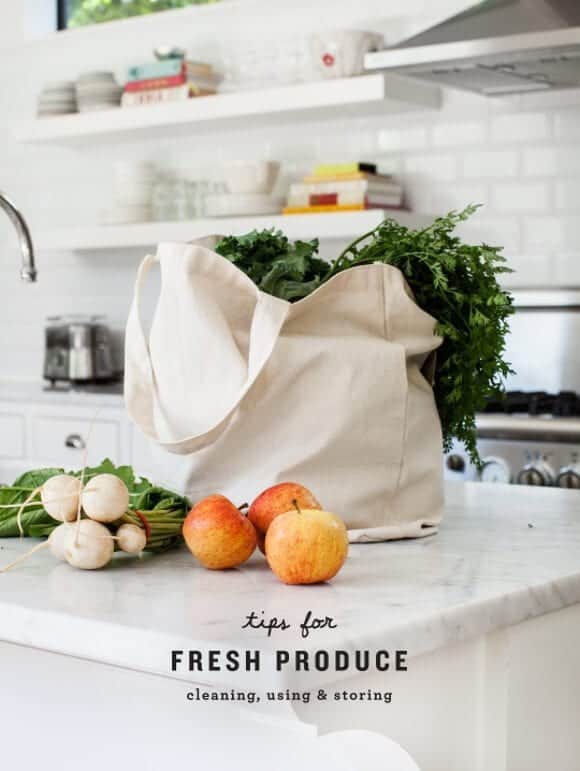
Once or twice a week, I get a huge bounty of fresh produce. My Farmhouse box arrives every other Wednesday, and I shop my local farmers market on Saturdays. Over the years I’ve learned a few strategies for cleaning, storing and using fruits and vegetables to make sure everything lasts throughout the week. I absolutely hate throwing food away. I know you do too, so I’m hoping you find this little guide helpful to avoid food-waste for yourself.
We’ve partnered with McCormick to share these tips as well as a few easy ideas to whip up farm-fresh dishes using their Gourmet dried herbs & spices.

CLEANING TIPS:
1. Wash fresh fruits and vegetables (except mushrooms) in cold running water. Clean mushrooms with a damp cloth to gently remove the dirt.
2. I like to wash leafy greens in a large bowl so any dirt can fall to the bottom.
3. Dry salad leaves in a spinner or just lay them on a towel for 20 or so minutes.
4. Scrub root veggies (sweet potatoes, carrots, etc.) with a brush to remove dirt. Or just rinse & peel, but I like to preserve the nutrients by leaving skins on.
5. Except for leafy salad greens, fruits and vegetables should be washed just before you’re ready to use it, (i.e. not days in advance).

STORAGE TIPS:
1. Certain vegetables (and fruits) contain a gas called ethylene. Ethylene triggers the ripening process and will deteriorate some veggies faster. My #1 storage tip is to make sure you store ethylene-producing vegetables separate from ethylene-sensitive vegetables.
ethylene-producing produce: apricots, avocados, bananas, cantaloupe, melons, mango, peaches, pears, tomatoes.
ethylene-sensitive produce: apples, asparagus, broccoli, carrots, cucumbers, eggplants, green beans, leafy greens, potatoes, summer squash.
2. Store veggies un-cut to last the longest. Cut produce should be tightly covered and used within 1-2 days.
3. Below are a few storage suggestions. This is just a rule of thumb – your vegetables may last longer or shorter depending on when (and where) they were picked and when you took them home.


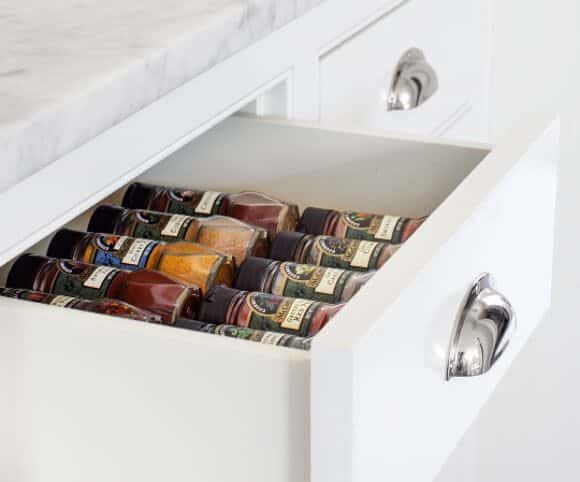
USING FRESH PRODUCE:
At the start of the week (with the freshest fruits & veggies):
I always use up my most fragile produce first. Early in the week I make salads from crisp lettuces, cucumbers, peppers, and lightly roasted summer or winter squash. I start the week off with lightly cooked meals while produce is at peak freshness. For example:
Salads with chili-lime dressing: whisk olive oil, lime, honey, and chili powder.
Sliced veggie plates with hummus: blend chickpeas with olive oil, lemon, garlic, salt, pepper, cumin & coriander.
Simple pasta: lightly sauté summer squash with basil, oregano & parmesan.
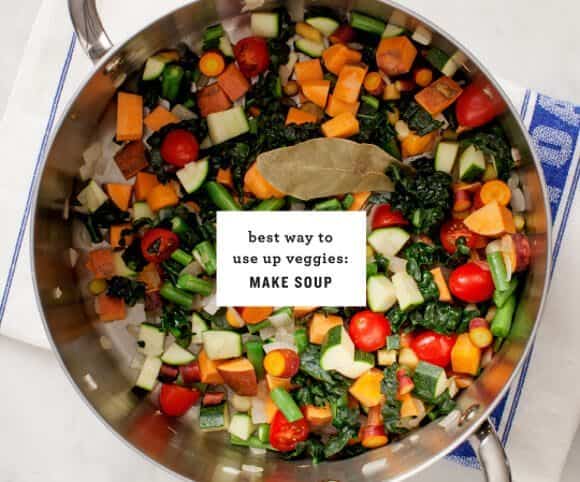
Toward the end of the week (with any veggies that are left):
I usually end up with a random assortment of (lightly wilted) veggies to use up. I often make frittatas or stir fries but, especially now that it’s fall, my favorite go-to meal is soup. Chop everything up and toss it in a big soup pot with olive oil, salt & pepper. Cook veggies until lightly browned, add a splash of white wine (or white wine vinegar) and let it cook out (2-3 minutes). Add vegetable broth and simmer until all veggies are cooked through. Create different flavor profiles by changing just a few spices and pantry items:
Mediterranean: add crushed red pepper, bay leaves, oregano & a can of tomatoes. (Click for the full recipe).
Mexican/southwestern: add coriander, chili powder, cumin & black beans for a soup that’s similar to this vegetarian chili.
Indian: add madras curry, turmeric, cayenne & a can of coconut milk for a creamy curried soup similar to this one.
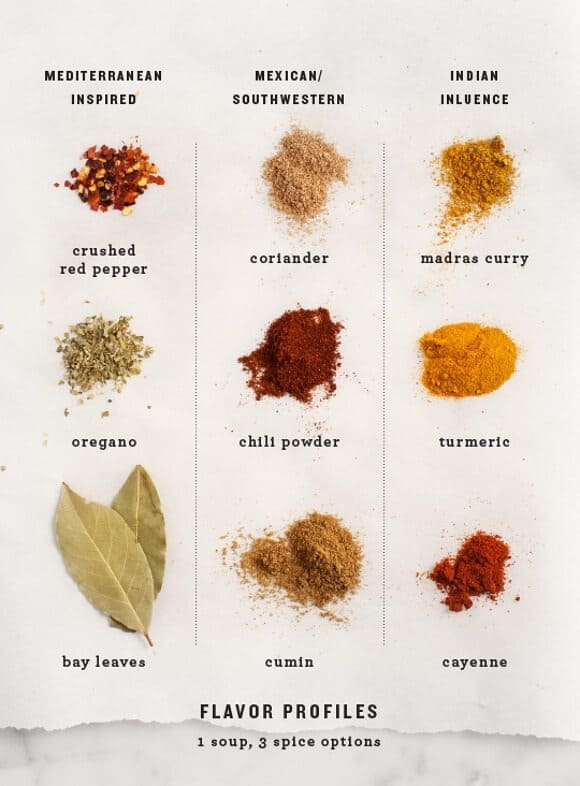
This post is sponsored by McCormick. All thoughts, words and images are my own. Thank you for supporting the sponsors that support Love and Lemons.








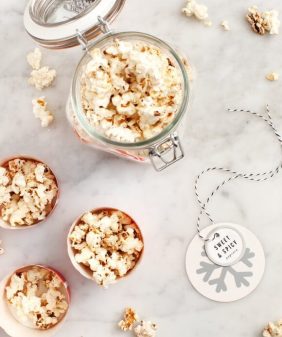


Great tips, Jeanine! Jealous of your highly organized spice drawer….mine is in shambles right now!
I just found your blog and love it. This is SUCH a useful reference—not to mention I now will save money by not throwing away produce gone bad quickly (thanks, especially, to the ethylene tip). Thanks for the great information.
Natalie
These are great tips! This also explains why my avocados always go bad so easily, haha…
Hi
I like your website. The recipes are very good and organised. Have a look at my website: http://www.givemesomespice.com/
I would welcome your comments.
Thanks
Mina
So helpful. Thanks so much for the guides and recipe ideas.
ha! i cut all the veggies i had and made them in to a soup tonight – great minds think alike 🙂
i love this blog post, i’m going to bookmark it
Great tips! Happy Thursday, Jeanine 🙂
http://www.lovecompassionatelee.com/
OMG this is the best. Thank you!
Also… can I have your kitchen??? <3
Thanks for this super-detailed and clear post! You’ve actually told me something new about which veggies shouldn’t be stored together, and now my apples are resting comfortably in the fridge. Thanks!
Thank you so much for this post. So helpful. Wondering if you could also tell us where you got the big canvas bag? Looks like a great bag to use at the market!
Hi Susie, I got it for free somewhere (I turned it around so the logo that’s on it wouldn’t show in the photo) 🙂
Thanks Jeanine. It does look like a great bag! Keep up the wonderful posts and recipes.
I got hungry because of your photos! Fantastic website. Lots of helpful information here! Thank you! <3 I'm coming back soon!
I <3 <3 <3 all the tips & tricks here cause I have always had problems with too much veggies I usually buy at Farmers Market. Thank youuuuu.
P.S. I love those photos as always; simply wonderful 🙂
awesome post! I gotta stop storing my tomatoes in the fridge! what is the reason for that? Does it affect the flavor? Because I think they do last longer in the fridge.
yep – they lose their flavor and become bland really quickly.
Love the pictures! You make everything look so yummmmmmmyyyy!!!
Wow I was doing so much wrong, so helpful. Thank you for posting this!
Thanks for the great tips! I really avoid to throw out food, so I use up as much as possible – even if the veggies don’t look so nice any more. Wrinkled bell peppers and tomatoes are just fine in a ratatouille or a veggie-lasagna.
I hate throwing out food but do it far too much so these tips are great! Until recently I’d been putting my tomatoes in the fridge – they really do taste so much better when you leave them out on the counter.
I know, it’s hard sometimes to use everything up on time! Tomatoes are the one rule I never break – they don’t last super long but they taste so much better left out of the fridge 🙂
Thanks for the tips! Some of my fruits and veggies have been known to go bad before I can use them. I’m working on doing more kitchen and cooking tips on my blog, so it’s inspiring to see how helpful it is to others.
Oh man, I definitely need to print this. So useful!
This post is definitely getting bookmarked. Despite dealing with some of the same veggies every season, I still find myself asking google “how to store…” before I put my veggies away. Thank you for the great reference page!
you’re welcome!